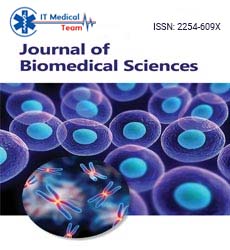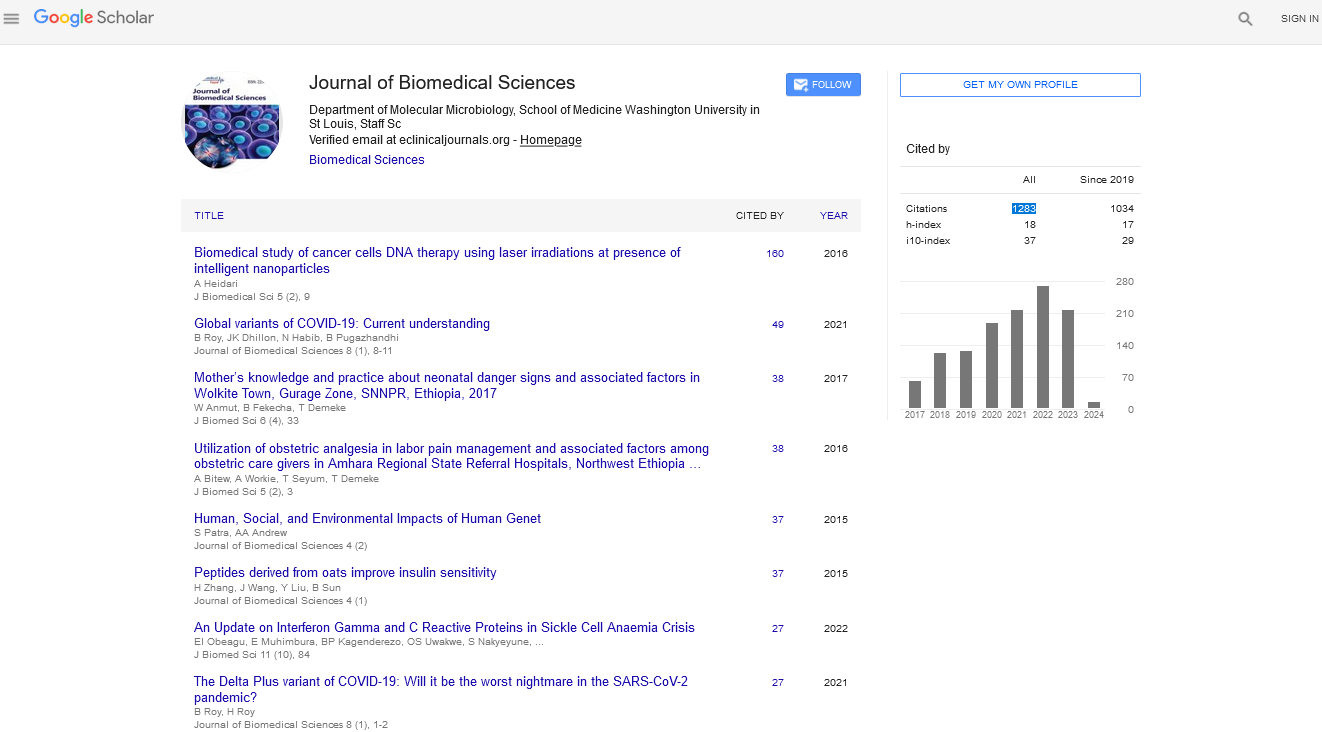Larisa Bungay*
Department of Biology, Immanuel Kant Baltic Federal University, Russia
- *Corresponding Author:
- Larisa Bungay
Department of Biology,
Immanuel Kant Baltic Federal University,
Russia,
E-mail: larbun@gmail.com
Received Date: October 26, 2021; Accepted Date: November 09, 2021; Published Date: November 16, 2021
Citation: Bungay L (2021) Adverse Effects of the Absorption of Plant Sterols. J Biomed Sci Vol. 10 No. S5: 001.
Description
Men traditionally have higher dietary cholesterol intakes than
women. Although there has been a steady decline in dietary
cholesterol intakes over the past several decades, the recent
focus on low-carbohydrate diets has shifted dieters to diets that
remain high in sources of dietary cholesterol and saturated fats.
Although studies of low-carbohydrate diets do not show
worsening of Low-density Lipoprotein Cholesterol (LDL-C) even
at 1 year, the concern is that higher cholesterol intakes still place
patients at long-term Coronary Heart Disease (CHD) risk. Four
cohort studies reported on by Stamler and Shekelk noted an
association between dietary cholesterol and risk for CHD
independent of the serum cholesterol level. Although food
frequency records in men and women followed prospectively
indicated that one egg per day did not increase Coronary Heart
Disease (CHD) risk, this was not true for diabetic men and
women in these cohorts. For those with hypercholesterokmia,
Adult Treatment Panel III (ATP III) recommends that less than
200 mg/d of dietary cholesterol should be consumed to
maximize the amount of low-density Lipoprotein Cholesterol
(LDLC) lowering that can be achieved through reduction in
dietary cholesterol.
Plant Stanol and Sterol Esters Cholesterol is the sterol
component of mammalian cell membranes. Plant sterols such as
sitosterol, campesterol, and stigmasterol are structurally similar
and their ingestion by humans can inhibit cholesterol
absorption, stanols are saturated sterols without double bonds
in the sterol ring structure.
Mechanism of Action
Plant sterol and stanol esters compete with dietary
cholesterol for absorption via mixed micelles. Usually, only a
small amount of plant sterols and even less of plant. Stanols are
absorbed. Ingestion of products enriched with plant sterol/
stanol esters does not cause fat malabsorption. The efficacy of
the plant sterol and stanol esters in lowering cholesterol appears
to be similar. Men analysis shows that the dose response
relation is continuous up to a dose of about 2 g of plant sterol or
stanol per day, although there is considerable variability of
response. The reduction in the concentration of Low-density
Lipoprotein Cholesterol (LDLC) at each dose is significantly
greater in older people than in younger people. Levels of TG and
High-level Data Link Control (HDLC) are not affected. A
randomized clinical trial in the United States suggested a dose
dependent response with 3 g/d lowered Low-density
Lipoprotein Cholesterol (LDLC) 10.1% with no significant
reduction in scrum vitamin A or LS hydroxyvitamin D levels.
Consumption of plant sterol or stanol ester enriched products
appears to be generally safe, but there is a reduction in ficarotene
absorption. The AHA has expressed concern with the
use of these products in children and pregnant women. A
workshop of experts convened in 2001 noted that safety testing
of sterols and stanols has exceeded that of ordinary food-stuffs
that are eaten widely and generally recognized as safe. Adverse
effects of the absorption of plant sterols into the circulation
appear largely hypothetical in adults.
Plant Sterols and Coronary Heart Disease Based on their
proven ability to lower Low-density Lipoprotein Cholesterol
(LDLC), Law suggested that a reduction of Coronary Heart
Disease (CHD) of about 25% could be expected with regular
dietary supplementation with plant stanol esters. A subgroup
analysis of the Scandinavian Simvastatin Survival Study indicated
that Coronary Heart Disease (CHD) subjects with evidence for
low cholesterol absorption, but not high absorption,
experienced reduced Coronary Heart Disease (CHD) events
during simvastatin treatment.
Conclusion
This suggested a combined role for plant sterols and statins in
those with high cholesterol absorption and low synthesis. There
has been concern that elevated plant sterol concentrations
could increase risk of Coronary Heart Disease (CHD).
41182





